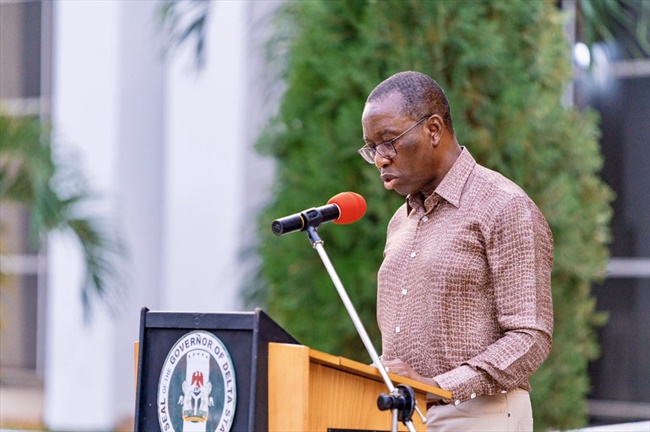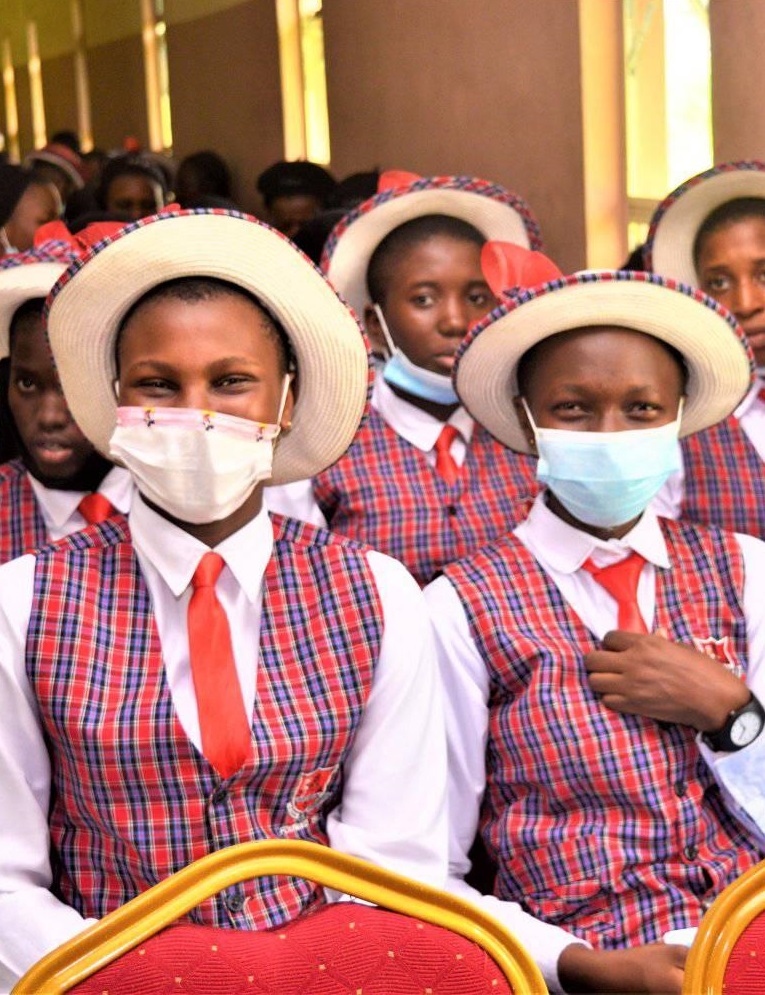The Future Starts Today – Speech at the Education Summit at the Event Centre, Asaba.
- Saturday, October 2, 2021

I welcome all of you to this Education Summit, the first of its kind in Delta State. From the parents, community leaders, principals, head teachers, administrators, labour leaders, private school owners, and the various stakeholders in the education sector, I thank you for honouring our invitation to this event. It is my sincere hope that we would all find this two-day Summit enriching and rewarding. Please permit me to single out for special recognition and appreciation, the Chairman of the occasion, Chief Afe Babalola, a patriot whose trailblazing strides in the legal profession and the field of education are greatly inspiring. Afe Babalola University, which he founded, has not only carved a niche for excellence, it has, in a very short time, gained a sterling reputation as one of the best universities in Africa.
My sincere gratitude also goes to the Keynote Speaker, Pai Obanye, renowned educationist and Professor Emeritus, and the various lead speakers. Thank you, distinguished guests, for making out the time to come to Asaba for this Summit. We greatly value your engagement and support to help us build an innovative education model for Delta State. The hosting of this Education Summit is a step forward in the fulfilment of my promise, upon assumption of office, to examine, evaluate and reengineer the educational system in Delta State with emphasis on teaching excellence, innovation, better learning outcomes, community involvement and social transformation. The ultimate aim is to develop a more robust, student-centred and transformative educational system that is responsive to the constantly expanding socio-political milieu. In an increasingly competitive global economy where the most valuable skill you can sell is your knowledge, a good education is no longer an option; it is a necessity. Hence, a cardinal policy objective of our S.M.A.R.T agenda is the pursuit and implementation of educational policies/reforms with the overall purpose of turning out products that will be able to compete and excel in the 21st Century. Since the adoption of the Education for All (EFA) and Millennium Development Goals in 2000, Delta State has made remarkable strides in the implementation of the concept of universal participation in education. There are currently 1,113 public primary schools with total enrolment of 370,611, while the number of public secondary schools, inclusive of the six functional technical colleges, stands at 446 with a corresponding enrolment figure of 262,242 students. At the tertiary level, there are three polytechnics and Colleges of Education each, and a university owned by the State Government. As the demand for education continues to rise, we have also witnessed rapid growth in the number of privately-owned schools. Currently, the number stands at 2,306, comprising 1,548 nursery and primary schools and 758 secondary schools.
The exponential rise in the number of private schools means the State Government has to regularly strengthen its oversight and monitoring functions to ensure compliance with extant laws and regulations, and enforce quality standards. In the light of these developments, budgetary allocation to the education sector has witnessed more than ten-fold increase over the years as successive governments continued to prioritise expansion and increased access to education, especially among the poor and most vulnerable. In the 2007/2008 academic year, the State Government introduced a free education policy that abolished all forms of fees and levies. Till date, there are no fees charged in any public pre- primary, primary and post-primary schools in the State. However, it does appear we have reached a crossroad in the education sector. The sector is currently plagued by funding gaps necessitated by the demands placed on systems struggling to cope with increased enrolment, decaying infrastructure, obsolete curriculum, out-dated teaching methods, and generally falling standards in the quality of education. Indeed, the impressive enrolment figures have a flip side that is not as glaring as the financial and physical data. Many products of our current educational institutions fall below the threshold of real learning, which is measured by the development of core competencies, including literacy, numeracy and life skills. Too many of our high school leavers and adults do not possess the knowledge and critical thinking skills required for the technically complex jobs of the 21st century. Our nation is thus confronted with a paradox. While millions of young people are roaming the streets in search of employment, thousands of skilled, technical jobs are begging to be filled in many companies and even in some Government agencies. Employers simply cannot find workers with the skill-set that these jobs require.
This tragic reality underscores the crisis in our education sector, and calls for the formulation and implementation of innovative policies and rigorous standards that equip students with the requisite technical and vocational skills for business, trade and commerce. It would seem that the quantitative aspect of education, exemplified by the “Education for all by the year 2000” mantra, was the primary focus of policy makers, lawmakers and advocates over the years. Success was predicated on access by the most vulnerable, undeserved and marginalised. Very little attention, it appears, was paid to issues relating to education quality. However, the attainment of universal participation in education cannot really happen in the absence of quality education. Sustained access to quality education with positive student outcomes is imperative for long-term improvements in productivity, the reduction of intergenerational cycles of poverty as well as advancements in preventive health care. It also enables women empowerment, bridges the socio- economic divide, and fosters inclusive economic growth and sustainable development. In Delta State, our goal is to provide the best education available for every student. With strong emphasis on science, vocational and technical education, we hope to harness the power of technology to empower our children with rigorous, high quality, customised education necessary for them to thrive in today’s dynamic marketplace. But there are challenges. On top of that list is the ever expanding education budget amid the deepest downturns in the economy we have experienced in recent times. As we meet here today, the national economy is showing no visible sign of improvement as world oil price continues to tumble below the budget benchmark of $38 per barrel. The way things stand today; it is only logical – and reasonable – not to base our expectation for a brighter economic outlook on hopes of a stable domestic oil production and increasing oil prices. It has, therefore, become extremely important for all the three tiers of Government to engage in aggressive and accelerated internal revenue generation drive. But that process, as you can imagine, will take some time to yield the desired dividends. Meanwhile, we have to build new schools, equip existing ones, accelerate digital learning, attract and retain competent teachers, and enhance the overall learning climate in our schools. This is the dilemma that we face at the moment, and I sincerely hope this Summit will proffer innovative approaches for funding education in the 21st century. Of particular concern to this administration is the need to channel funds where they will produce the best results in the most efficient manner. We need more money. We also need more reforms.
One area where that is urgently needed is in the area of curriculum review and development. This Summit should come up with a template for aligning our schools’ curricula to the needs of the society and related industries, and the modalities for revising the curricula on a regular basis for continuous improvement. This is critical to enhancing the quality and relevance of education so that all children achieve meaningful learning outcomes. There is also the issue of excellence in teaching. Next to parents, teachers are the most influential people in a child’s academic life. It has been said that great teachers help create great students. A well-trained and competent teacher with noble disposition is a critical factor in determining student performance and achievement. Therefore, it is of utmost priority that we evote considerable attention, resources and energy on how we train and support both new and experienced teachers.
This administration has already made provision in the 2016 approved budget for the establishment of a Teachers Professional Development Centre for regular in- service training. I expect this Summit to advance initiatives that improve educational quality and ensure children are taught by effective and high quality teachers. It should, therefore, take a thorough examination of such issues as scaling up teachers’ performance, pathways for career development, and rewards for success. The third challenge we must address is the urgent need for parental involvement in the public school system. It is our responsibility as policy makers, lawmakers and as educators to put the necessary structures in place for efficient service delivery to our students and communities. It is also the responsibility of every citizen to participate in the process by taking active interest in the running of the schools and the academic performance of their children. Ultimately, no policy, structure or programme can take the place of a parent. We still need the parents to volunteer for services in our schools, attend PTA meetings/conferences, help their children with homework, read to them when they can, and set good examples of morality and discipline. As a father and the proud husband of a teacher, I know that the responsibility for our children’s education begins at home. Finally, confronting the challenges as highlighted is not only a moral imperative; it requires a timely and concerted response. I believe that all children deserve a chance to achieve their full potential in life. This can only happen when they are given the right kind of education that is not only based on universal access but also anchored on innovation, rigorous standards, teaching excellence, digital learning and continuous improvement. That is our goal. And God helping us, we shall deliver on this promise.





